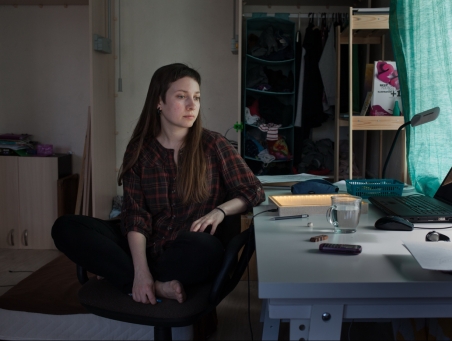Distorted Reality

Watching the world through a news-media prism can create the impression that our planet is trapped in a permanent state of crisis.
Foreign coverage in German media has focused on the financial crisis, the Greek crisis, the Ukrainian crisis and, until recently, the refugee crisis. Until last summer, readers might have gotten the feeling there were crises everywhere, except at home in Germany.
All that changed when refugees from Syria, Afghanistan, Eritrea, Iraq and elsewhere started arriving en masse in Germany.
This post is a result of the 2015 n-ost Media Conference, "Translating Worlds," which took place in November 2015. For more essays on foreign reporting, and theses on photojournalism, please see the brochure below, or visit our website on the conference.
Suddenly, friends abroad began asking us about the migrant crisis in Germany and how we were dealing with it. Foreign reporting about the incident on New Year’s Eve in Cologne painted a picture of criminal migrants threatening the country. Recently, I've been forced to explain—and not only to Russian and Ukrainian colleagues and friends—despite 1.1 million refugees having come to Germany in 2015, that most parts of Germany have not undergone dramatic changes. Even in Berlin, you can travel on public transport across the city without seeing a refugee.
I've had to explain to them how the situation in Germany is really much more complex than this misconceived, crisis-driven image. It reminded me of Indians who had once explained to me that rape does not characterize their country, or Mexicans, angered their homeland is only seen through the lenses of drugs and criminality.
Exaggeration and sensationalism run rampant
The media, especially in these digital times, tends to exaggerate, sensationalize and blow developments out of proportion. The traditional barriers between serious reporting and tabloid excess have fallen, even in foreign reporting. Space and interest for stories detailing normal life in foreign countries have been constricted by news of catastrophes and states of emergency.
I remember my surprise when I first went to work in Gaza and passed the day without seeing anybody with their face hidden behind a mask. On my second trip, I only saw a small group of about 10 fighters in the street. They were immediately surrounded by news photographers.
These are the moments when one begins to understand just how journalists tend to create a caricature of life when working abroad as a reporter.
Many news consumers realize there is something wrong with the picture of the world they are presented. As a result, skepticism about foreign reporting is growing. Travelers know from experience how surprising arriving in a new country can be. It looks and smells different, and people behave differently from what may have been expected from reading media reports. They experience the normal everyday life, a scene mostly absent from foreign reporting, rejected as too boring.
The well-known German historian, Karl Schlögel, visited Ukraine in the spring of 2014 and was surprised that things seemed to function normally despite the crisis. People went to work, children went to school and trains continued to arrive on time. The Ukrainian crisis was not everywhere in Ukraine as news outlets had led us to believe. Life goes on, even during war.
Losing continuity
Several factors have diminished the quality of news reporting. Foreign correspondence is expensive; high costs have forced outlets to reduce their network of staff journalists abroad.
Many countries are reported on exclusively by roaming journalists, mostly freelancers, sent in from time to time to report on specific stories, rather than to follow long-term developments. Often they do not speak the local language and have only a small network of contacts. This is very different from the situation of staff correspondents who live in the country and develop a long-term understanding of what is really going on there.
At the same time, newspapers have reduced space for foreign reporting. Competition is steeper, and stories need to be more dramatic to be published. There is a greater focus on war, crisis and natural catastrophe—these stories win the competition for attention.
If one story tops the agenda, media outlets single-mindedly neglect other issues. We seldom read about the Greek economy or Ukraine anymore – or at least we won't until they erupt into crisis again. We are losing the continuity we need in foreign reporting. And even the refugee crisis—ubiquitous in German media for months – is seeing less coverage since the Balkan route was blocked and refugees became stuck in Greece. Attention has moved on.
And certain regions are blind spots for the German media, including the Gulf, Central Asia and the Caucasus, even India. They need to be continuously reported on—before a future crisis turns them into sudden areas of interest for our readers.
Simone Schlindwein, a freelance correspondent working for the German newspaper Tageszeitung in East Africa, says it has become nearly impossible to sell stories from Africa that don’t have something to do with murder, war, hunger, or refugees. Yet there are more than 50 African countries, and most are not at war—the diversity of life there is completely neglected.
More responsible approaches needed
Living in a globalized world means that German media needs to take a more responsible approach to foreign reporting. It should not merely copy the US media’s mistakes by becoming more provincial. Instead, German media should promote alternative approaches, new priorities and more diverse views.
Refreshing new online media around the world attempts this. Unfortunately, many are niche products and lack the impact of more established outlets. But their ideas are inspiring and heading in the right direction.
The web portal, Journafrica, for example, features African writers and scientists in its content in order to present a refreshingly different mix of information about the continent. Dekoder offers interesting articles from the Russian press translated into German with contextual information and explanations of differing perspectives. Recently integrated into Public Radio International, the American digital news site, GlobalPost, offers a fascinating focus on world news coverage and, at one time, even employed an impressive network of correspondents and freelancers around the world.
A constructive approach
The debate surrounding “constructive journalism,” started by Danish journalist Ulrik Haagerup, has become a resource in searching for new methods in foreign reporting.
Haagerup says negative reporting is a dead end. He suggests more coverage for constructive ideas and the search for solutions.
Following this idea, German digital outlets, including Spiegel Online, invite readers to comment on some of the stories they’ve produced.
One of their stories was about police reform in Los Angeles helping to reduce crime rates and build new relationships between the police and citizens. The story stood in contrast to the prevailing picture of police racism in the United States following scandals in Ferguson, Baltimore and Cleveland. Another story focused on Syrian refugees in eastern Germany. The magazine revisited the same family its reporter had met when they first arrived the previous year. Now they have an apartment, speak fluent German, and the father is beginning training as a nurse.
Stories like these are good examples of constructive journalism that debunks prejudices by telling a story differently.
Journalism should be critical. But it does not have to focus on negative or present issues as black or white. This could be a valid approach for improving the balance of foreign reporting and regaining the interest and trust of our readers.
The 2015 n-ost Media Conference, "Translating Worlds," yielded five essays on the challenges facing today's foreign correspondent, as well as a series of seven photo-theses concerning modern photojournalistic practice. The complete works can be found in this brochure.

